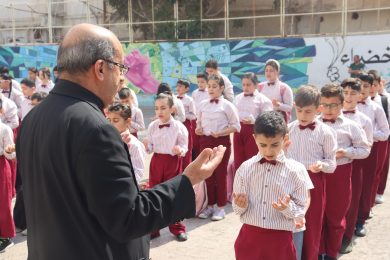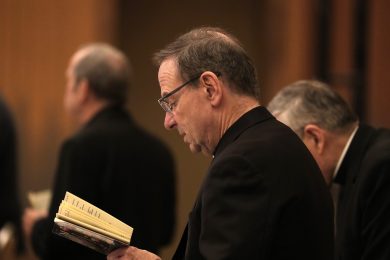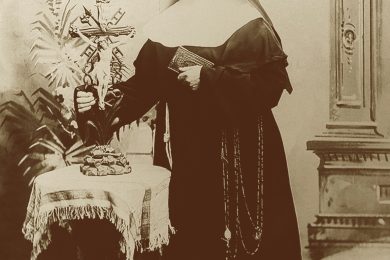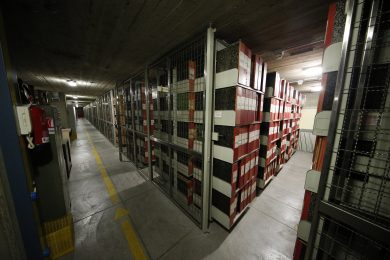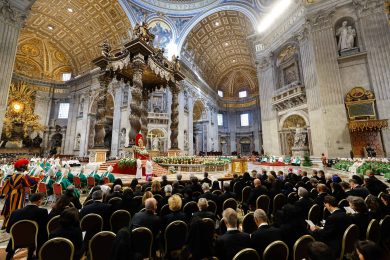(OSV News) — Being a Catholic dad is both a great privilege and a big responsibility. Along with their mothers, we’ve been entrusted to raise our kids to know and love God and to prepare them for lives as Catholic men and women. Odds are, we’re good at it, we enjoy it, and we all deserve a pat on the back for the work we do raising our children in the faith. In this list, you will undoubtedly see some things suggested that you’re already doing. But you may also see some that serve as reminders of how to be a better and more effective Catholic dad. As we celebrate Father’s Day, pick one or two of the following practices that will make a big difference for your family, and start doing them.
1. Keep holy the Lord’s Day — and all those other days (Ex 20:8)
Fatherhood is the ultimate exercise in getting priorities straight. In too many households, mom is the “keeper of the faith.” She’s often the one who herds the family into the car on Sunday morning for Mass. But this cannot be good enough for us. Our kids are watching, and they will do what we do. They’re watching if we’re ambivalent about getting to Mass. They’re watching if we’re checking the time during the homily, calculating whether or not we’ll make it home before kickoff. But the good news is, they’re also watching when we do things right! My dad can’t carry a tune in a bucket, but he sings in full voice every Sunday; our kids notice when we have our priorities straight — when we sing, pray and actively participate with our faith communities.
2. Teach your children faith (Jn 20:29)
If we want our children to have faith in God, we’ll teach them to believe in things they cannot experience with their five natural senses. Talking about molecules, or germs or black holes is a good start. We all accept that there are everyday realities we’ll never see firsthand, but that are real. This is, of course, the foundation for teaching them our faith. We need to nurture our own faith, of course, in order to be able to teach it — whether that means regular prayer and Scripture study, spiritual reading or active involvement in our parishes. Faith is learned best by example, and it requires genuine belief. It requires surrender. And the single best way to raise children who have unshakable faith in God is to teach them that there are things they can trust and believe in unconditionally — like their dads.
3. Don’t forget forgiveness (Mt 18:21-22)
The sacrament of reconciliation is a uniquely Catholic ritual. Few other traditions require that sinners confess sins aloud. In this way, Catholicism teaches accountability as well as reminding us of God’s bottomless well of forgiveness — great lessons to teach our kids. But it’s easy to leave those values at the confessional. As Catholic fathers, we have an added responsibility. The accountability our faith has taught us requires us to admit to our children when we are wrong, ask their forgiveness when we mess up, and show them that we and their mothers forgive, and ask forgiveness of, each other all the time. This reminds them — as God reminds us — that mistakes are allowed. They are fully human and fully expected as part of our faith journey.
4. Give and let give (Prv 28:27)
An old expression advises, “When there’s a piano to be moved, don’t reach for the stool.” Generosity certainly isn’t a value unique to Catholicism. But making it a non-negotiable part of our families’ lives — no matter what our circumstances — is a part of our faith. Again, this is behavior we as dads can and must model if we expect our children to learn compassion. Let your kids put the envelope in the church collection basket on Sunday. When family, friends, or charitable organizations ask for your help, identify what you enjoy or what you’re best at and pitch in. Let your children see you giving, and talk with them about why you give and why giving is important.
5. Play and have fun (Lk 18:16-17)
My wife, a Catholic theologian, has a favorite quote from Rabbi David Wolpe’s book “The Healer of Shattered Hearts”: “It doesn’t have to be somber to be sacred.” Many of us make the mistake of expecting our children to apply an adult’s maturity and sophistication to our faith, but one path to revealing the beauty of Catholicism is allowing kids to experience it on their terms. Using play, story and song to allow Scripture and tradition to unfold for the youngest of our flock is the foundation of children’s Liturgy of the Word, vacation bible school and religious education classes. When my wife and I read Bible stories to our kids, we do character voices. When we’re driving home from Mass, we re-sing the closing song (the upbeat ones, anyway). If we truly believe we are created in God’s image, then certainly laughter and lightheartedness can enrich our faith as well.
6. Get caught praying (Lk 11:1)
Get “caught” praying, and pray with your children — over meals, at bedtime, anytime. Praying with someone is a pretty intimate act. In our house, we have a little outline we like to follow. We always start with prayers of gratitude, thanking God for our many blessings. Then, we move to asking for blessings for people we know and love, or for people who might need God’s help. Finally, we can get into the nitty-gritty “gimmes”: praying for good weather for field trips, or for the strength and wisdom to do well in our work or at school. Doing so teaches our kids that we’re all in an ongoing relationship and conversation with God. And that the conversation requires them to talk as well as to listen.
7. Be “Mr. Doesn’t- Know-It-All” (Ps 139:5-7)
The sky is blue. “Why?” Because of the sun. “Why?” Because when short-spectrum light waves from the sun enter our atmosphere, they strike air molecules and our eyes perceive the effect as blue. “Why?” Sigh. We’ve all played the “Why?” game. Dads often put a lot of pressure on themselves not to get stumped. But questions of faith are common (and often come out of the blue):
“Why do we die?” “What’s a soul?” “How does that Trinity thing work?” Unfortunately, satisfying answers aren’t always at the ready. “Go ask your mother” is only acceptable once — twice if it’s Father’s Day. “I don’t know” is a legitimate answer, but the real grace comes in what we say next: “Let’s look it up together.” There is something special about finding answers with our children. Those are the lessons that stick.
8. Might for right (2 Cor 13:7-8)
“Integrity” is a term that gets thrown around pretty casually. In a celebrity-dominated culture, it can be easy to overlook the actions of public figures and forget that they’re setting examples for our kids. It can be challenging to point out to our kids that the poor choices publicized in popular culture go against our values as Catholics, particularly if the celebrities in question are on posters decorating their bedroom walls.
That being said, however, the major gaffes that make tabloid headlines can be blessings that allow us to pass on our values. They can be an entrée into conversations about morality. They can be teachable moments that demonstrate to our kids that actions have consequences. And … they can make Catholic parents seem really uncool. These are the moments that separate the men from the boys in fatherhood, the defining conversations that distinguish us as parents rather than playmates. These are the times that we not only teach what the word “integrity” means, but show our children that we have it.
9. Let it shine, let it shine, let it shine (Mt 5:14-16)
We’re all familiar with the professional athletes who, after winning the Super Bowl or an Olympic gold medal, praise Jesus for their success. While it’s great to thank God for outstanding talent, we need to resist the temptation to compare our talents and abilities to the stratospheric examples broadcast on national television and feel that our gifts somehow fall short. It’s important to remind our kids that — whatever their gifts — they’re created in God’s image, and their gifts are to be celebrated, used and cherished. A gift for spelling, singing or math is no less worthy of praise or recognition than the gift of a deadly jump shot or a 90-mph fastball. Put test papers up on the fridge. Encourage the kids to pull out their guitars at family parties. Invite their grandparents to the school play. Find ways for your kids to shine in the ways they’re most comfortable.
10. Traditionnnnn! Tradition!” (1 Cor 11:2)
My mother collected more than 100 statues of the Madonna, and her devotion had a huge impact on me, my four siblings and scores of others she met throughout her life. After she died, most of those statues went back to the people who gave them to her as reminders of my mother’s belief in the strength of Mary’s holy intercession. When I tell that story to non-Catholics, however, it never has the impact I look for. Let’s face it, like Tevye in “Fiddler on the Roof,” we as Catholics hold on to much “tradition” that other religions just don’t “get.” Ashes on our foreheads. The Hail Mary. The communion of saints. Rosaries. Novenas. Holy water. These “sacramentals” are what make us uniquely Catholic. They give comfort, grow faith and are very much worth preserving. Passing on these rituals to our children — not just by rote, but by practice — teaches them that being Catholic means that they are part of deep and long-held traditions. And it teaches them that, as Catholics, they will never be alone.
– – –
Cory Busse writes from Minnesota.




